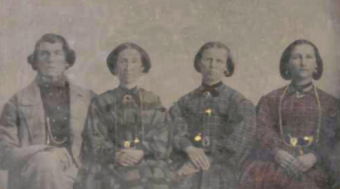Multiple Mates
Polygamy, as used in this study, is defined as one man being married to more than one woman at a time, or one woman married to more than one man at a time.
Strictly speaking, the Old Testament practice of one man having multiple wives at one time is known as polygyny and not polygamy. That said, an important fact to remember regarding polygamy is that it has fundamentally always been something indulged in only by rich men.
Perhaps the most well-known modern case of polygamy is with the U.S. based religious group called the Mormons. The group's founder, Joseph Smith, as well as early leaders such as Brigham Young, were married to more than one woman at a time. In 1852, some of the church's leaders began to admit, openly, that polygamy had taken place in secret. At its peak, this practice affected between 20 to 30 percent of Mormon families.
Mixed Messages
Admittedly, the Bible seems to send mixed messages regarding polygamy. One the one hand, Genesis strongly implies that God intended marriage to be between only one man and one woman (Genesis 2:23 - 24). On the other hand, however, we find several individuals (many of whom had great faith) who had more than one wife at a time.

Notable Old Testament individuals who indulged in polygamy include Abraham, King Ahab, Gideon, Jacob, David, King Jehoram and Solomon.
The Lord warned any future Israelite king that they should not possess many wives whether or not they were fellow Israelites.
When you come to the land which the Lord your God gives you, and shall possess it and shall live in it and shall say, 'I will set a king over me, like all the nations that are around me,' . . .
Nor shall he (the king) multiply wives to himself, so that his heart does not turn away. Nor shall he greatly multiply silver and gold to himself (Deuteronomy 17:14, 17).
There does not seem, however, a corresponding prohibition that forbid the average Israelite male from practicing polygamy (at least if they were Israelites and not pagans).
God knew the rulers over his people would pursue multiple wives (polygamy) like all the other nations. He warned them not to do so in order to avoid the temptation of being led to worship pagan deities (Deuteronomy 7:1 - 4, 17:17).
Unfortunately, men like King Solomon did not follow this advice. Although he was wise, he nevertheless married a huge number of foreign women who turned his heart away from the Eternal (see 1Kings 11).
Polygamy and the Early Church
By the time of the early church, the general practice of polygamy had largely died out in the Roman Empire. Although the Romans themselves did not practice it, they did divorce and remarry when they wanted to change spouses. A few exceptions existed such as Herod the Great, who was a polygamist.
Although the New Testament does not directly address polygamy, the fact that it says almost nothing points to its decline. There are, however, several Scriptural-related passages on marriage, in the writings of Paul, which strongly infer that marriage to multiple partners was not an acceptable New Testament practice.
For example, he wrote to Timothy that one of the traits to look for in a good church leader was that he was "the husband of one wife" (1Timothy 3:2, 12). He also wrote this admonition to Titus as well (Titus 1:5 - 6). The church in Corinth was told one way to help avoid sexual immorality was to ensure that each person had one mate (1Corinthians 7:2).
Conclusion
What should Christians do in regard to polygamy? They should submit to the laws in the land they live in so long as they do not conflict with Biblical teachings (see Romans 13). A large percentage of countries in the 21st century have laws against such marital arrangements (with the exception of countries governed or influenced by Islam). Modern-day believers should reject the ancient practice of polygamy and stick to one woman for one man.